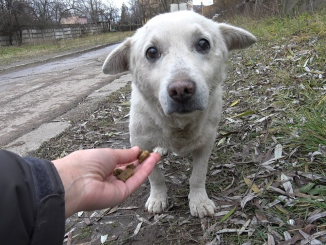Dogs’ brains are sensitive to the familiar high-pitched “cute” voice tone that adult humans, especially women, use to talk to babies, according to a new study.
The research, published recently in the journal Communications Biology, found “exciting similarities” between infant and dog brains during the processing of speech with such a high-pitched tone feature.
Humans tend to speak with a specific speech style characterised by exaggerated prosody, or patterns of stress and intonation in a language, when communicating with individuals having limited language competence.
Such speech has previously been found to be very important for the healthy cognitive, social and language development of children, who are also tuned to such a high-pitched voice.
But researchers, including those from the Eötvös Loránd University in Hungary, hoped to assess whether dog brains are also sensitive to this way of communication.
In the study, conscious family dogs were made to listen to dog, infant and adult-directed speech recorded from 12 women and men in real-life interactions.
As the dogs listened, their brain activities were measured using a functional magnetic resonance imaging (fMRI) scan.
The study found the sound-processing regions of the dogs’ brains responded more to dog- and infant-directed than adult-directed speech.
This marked the first neurological evidence that dog brains are tuned to speech directed specifically at them.
“Studying how dog brains process dog-directed speech is exciting, because it can help us understand how exaggerated prosody contributes to efficient speech processing in a nonhuman species skilled at relying on different speech cues,” explained Anna Gergely, co-first author of the study.
Scientists also found dog- and infant-directed speech sensitivity of dog brains was more pronounced when the speakers were women, and was affected by voice pitch and its variation.
These findings suggest the way we speak to dogs matters, and that their brain is specifically sensitive to the higher-pitched voice tone typical to the female voice.
“Remarkably, the voice tone patterns characterizing women’s dog-directed speech are not typically used in dog-dog communication – our results may thus serve evidence for a neural preference that dogs developed during their domestication,” said Anna Gábor, co-first author of the study.
“Dog brains’ increased sensitivity to dog-directed speech spoken by women specifically may be due to the fact that women more often speak to dogs with exaggerated prosody than men,” Dr Gabor said.

Dog With Cancer Lives Just Long Enough to See Her Dad Again

A routine trip to the vet for bad breath turned into heartbreaking news for Kermie’s family. The 11-year-old Lab-Beagle-Chow Chow mix, beloved by Eric Ralston, a principal hospital corpsman in the US Navy, had been diagnosed with oral carcinoma.
The grim prognosis gave Kermie only two to three months to live, leaving her family devastated. Little did they know that Kermie had her own plans, and she refused to say goodbye until her cherished owner returned home from his nine-month deployment.

Eric Ralston had been stationed overseas in March, leaving behind his loving family, including Kermie. When Kermie’s bad breath raised concerns, Eric’s wife took her to the vet for an examination. The devastating diagnosis of cancer shattered their hearts, as Kermie had been their first “fur child,” and they couldn’t fathom Eric missing the chance to see her again.
As time passed, Kermie defied the odds and continued to thrive. Three months turned into several, and hope began to flicker within the Ralston family. With Eric’s deployment nearing its end, they dared to dream that Kermie might get the chance to reunite with him.

However, just 12 days before Eric was scheduled to return home, his deployment was extended, dashing their hopes. The approaching holidays intensified their worry, with Christmas on the horizon, and Kermie’s condition remained uncertain. Still, Kermie persevered, displaying a remarkable will to see Eric once more.
Then, a Christmas miracle unfolded. Eric’s homecoming came earlier than expected, and Kermie was there to welcome him. Adorned with a red bow, she sprinted from the house and into Eric’s loving arms. The reunion breathed new life into Kermie, who had been on her last leg. Eric’s presence was a magic elixir for her, rekindling her appetite and zest for life.

Jennifer Ralston, Kermie’s human mom, remarked, “His return was some kind of magic lozenge for her.” The once-struggling Kermie was now eating and drinking without difficulty, savoring each moment of happiness with Eric by her side. In January, Kermie celebrated her 12th birthday, a testament to her enduring spirit.
However, February brought a turn for the worse. The good days became fleeting, and the Ralston family knew the time had come to make a difficult decision. On February 22nd, Kermie lost her battle with cancer, surrounded by Eric and her loving family.

Kermie’s story is a poignant reminder of the bond between humans and their canine companions. It showcases the incredible resilience and unwavering love that dogs bring into our lives. Though Kermie’s battle ended, her legacy of love and determination lives on, reminding us of the power of unconditional love between pets and their owners.
Please share this heartwarming tale with your friends to celebrate Kermie’s life and the enduring bond between dogs and their humans.



Leave a Reply